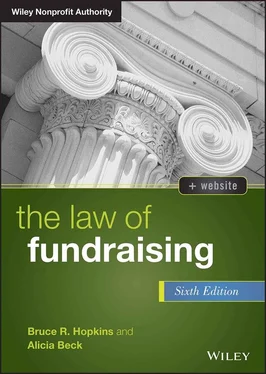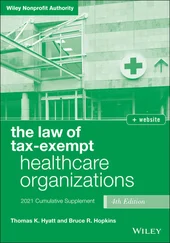Bruce R. Hopkins - The Law of Fundraising
Здесь есть возможность читать онлайн «Bruce R. Hopkins - The Law of Fundraising» — ознакомительный отрывок электронной книги совершенно бесплатно, а после прочтения отрывка купить полную версию. В некоторых случаях можно слушать аудио, скачать через торрент в формате fb2 и присутствует краткое содержание. Жанр: unrecognised, на английском языке. Описание произведения, (предисловие) а так же отзывы посетителей доступны на портале библиотеки ЛибКат.
- Название:The Law of Fundraising
- Автор:
- Жанр:
- Год:неизвестен
- ISBN:нет данных
- Рейтинг книги:4 / 5. Голосов: 1
-
Избранное:Добавить в избранное
- Отзывы:
-
Ваша оценка:
- 80
- 1
- 2
- 3
- 4
- 5
The Law of Fundraising: краткое содержание, описание и аннотация
Предлагаем к чтению аннотацию, описание, краткое содержание или предисловие (зависит от того, что написал сам автор книги «The Law of Fundraising»). Если вы не нашли необходимую информацию о книге — напишите в комментариях, мы постараемся отыскать её.
The Law of Fundraising
The Law of Fundraising
The Law of Fundraising — читать онлайн ознакомительный отрывок
Ниже представлен текст книги, разбитый по страницам. Система сохранения места последней прочитанной страницы, позволяет с удобством читать онлайн бесплатно книгу «The Law of Fundraising», без необходимости каждый раз заново искать на чём Вы остановились. Поставьте закладку, и сможете в любой момент перейти на страницу, на которой закончили чтение.
Интервал:
Закладка:
These two interrelated elements, then, are sizable forces in American society, far larger than in any other country. And they have contributed immeasurably to this country's social and scientific progress. On the ledger of recent contributions are such diverse advances as the creation of noncommercial “public” television, the development of environmental, consumerist and demographic consciousness, community-oriented museum programs, the protecting of land and landmarks from the often heedless rush of “progress.” The list is endless and still growing; both the number and deeds of voluntary organizations are increasing. “Americans are forever forming associations,” wrote de Tocqueville. They still are: tens of thousands of environmental organizations have sprung up in the last few years alone. Private giving is growing, too, at least in current dollar amounts. 21
Exemption from taxation for certain types of nonprofit organizations is a principle that is larger than the Internal Revenue Code. Citizens combating problems and reaching solutions on a collective basis—in “association”—are inherent in the very nature of American societal structure. Nonprofit associations are traditional in the United States, and their role and responsibility are not diminished in modern society. Rather, some contend that the need for the efforts of nonprofit organizations is greater today than previously, in view of the growing complexity and inefficiency of government. To tax these entities would be to flatly repudiate and contravene this doctrine that is so much a part of the nation's heritage.
This view of nonprofit associations operating in the United States has been most eloquently stated by Alexis de Tocqueville. He, too, espoused the principle of pluralism, as expressed in his Democracy in America :
Feelings and opinions are required, the heart is enlarged, and the human mind is developed only by the reciprocal influence of men upon one another. I have shown that these influences are almost null in democratic countries; they must therefore be artificially created, and this can only be accomplished by associations.… A government can no more be competent to keep alive and to renew the circulation of opinions and feelings among a great people than to manage all the speculations of productive industry. No sooner does a government attempt to go beyond its political sphere and to enter upon this new track than it exercises, even unintentionally, an insupportable tyranny; for a government can only dictate strict rules, the opinions which it favors are rigidly enforced, and it is never easy to discriminate between its advice and its commands. Worse still will be the case if the government really believes itself interested in preventing all circulation of ideas: it will then stand motionless and oppressed by the heaviness of voluntary torpor. Governments, therefore, should not be the only active powers; associations ought, in democratic nations, to stand in lieu of those powerful private individuals whom the equality of conditions has swept away.
But de Tocqueville's classic formulation on this subject came in his portrayal of the use by Americans of “public associations” in civil life:
Americans of all ages, all conditions, and all dispositions constantly form associations. They have not only commercial and manufacturing companies, in which all take part, but associations of a thousand other kinds, religious, moral, serious, futile, general or restricted, enormous or diminutive. The Americans make associations to give entertainments, to found seminaries, to build inns, to construct churches, to diffuse books, to send missionaries to the antipodes; in this manner they found hospitals, prisons, and schools. It is proposed to inculcate some truth or to foster some feeling by the encouragement of a great example, they form a society. Wherever at the head of some new undertaking you see the government in France, or a man of rank in England, in the United States you will be sure to find an association.
One distinguished philanthropist believed that if the leadership of the government and business sectors of U.S. society were to assume the responsibility for support of the private sector, “[w]e would surprise ourselves and the world, because American democracy, which all too many observers believe is on a downward slide, would come alive with unimagined creativity and energy.” 22
Contemporary writing is replete with examples of these fundamental principles. Those who have addressed the subject include:
… the associative impulse is strong in American life; no other civilization can show as many secret fraternal orders, businessmen's “service clubs,” trade and occupational associations, social clubs, garden clubs, women's clubs, church clubs, theater groups, political and reform associations, veterans' groups, ethnic societies, and other clusterings of trivial or substantial importance. — Max Lerner
… in America, even in modern times, communities existed before governments were here to care for public needs. — Daniel J. Boorstin
… voluntary association with others in common causes has been thought to be strikingly characteristic of American life. — Merle Curti
We have been unique because another sector, clearly distinct from the other two [business and government], has, in the past, borne a heavy load of public responsibility. — Richard C. Cornuelle
The third sector is … the seedbed for organized efforts to deal with social problems. — John D. Rockefeller
… the ultimate contribution of the Third Sector to our national life—namely, what it does to ensure the continuing responsiveness, creativity and self-renewal of our democratic society.… — Waldemar A. Neilsen
… an array of its [the independent sector's] virtues that is by now fairly familiar: its contributions to pluralism and diversity, its tendency to enable individuals to participate in civil life in ways that make sense to them and help to combat that corrosive feeling of powerlessness that is among the dread social diseases of our era, its encouragement of innovation and its capacity to act as a check on the inadequacies of government. — Richard W. Lyman
The problems of contemporary society are more complex, the solutions more involved and the satisfactions more obscure, but the basic ingredients are still the caring and the resolve to make things better. — Brian O'Connell 23
Tax exemption for charities and the charitable contribution deduction, therefore, are not anachronisms, nor are they loopholes. Rather, they are a bulwark against overdomination by government and a hallmark of a free society. These elements of tax law help nourish the voluntary sector of this nation, preserve individual initiative, and reflect the pluralistic philosophy that has been the guiding spirit of democratic America. The charitable deduction has been proven to be fair and efficient, and without it the philanthropic sector of U.S. society would be rendered unrecognizable by present standards.
In sum, the charitable deduction and exemption are predicated on principles that are more fundamental than tax doctrines and are larger than technical considerations of the federal tax law. The federal tax provisions that enhance charity exist as a reflection of the affirmative national policy of not inhibiting by taxation the beneficial activities of qualified organizations striving to advance the quality of the American social order.
Likewise, in the zeal to regulate charitable solicitations, government must take care not to destroy the very institutions that compose the essence of the American societal fabric.
§ 1.2 CHARITABLE FUNDRAISING: A PORTRAIT
From the standpoint of the law of charitable fundraising, two aspects of the portrait of charitable giving in the United States are important: the extent of charitable giving in general and the increasing use of the Internet for the purpose of soliciting charitable contributions.
Читать дальшеИнтервал:
Закладка:
Похожие книги на «The Law of Fundraising»
Представляем Вашему вниманию похожие книги на «The Law of Fundraising» списком для выбора. Мы отобрали схожую по названию и смыслу литературу в надежде предоставить читателям больше вариантов отыскать новые, интересные, ещё непрочитанные произведения.
Обсуждение, отзывы о книге «The Law of Fundraising» и просто собственные мнения читателей. Оставьте ваши комментарии, напишите, что Вы думаете о произведении, его смысле или главных героях. Укажите что конкретно понравилось, а что нет, и почему Вы так считаете.












